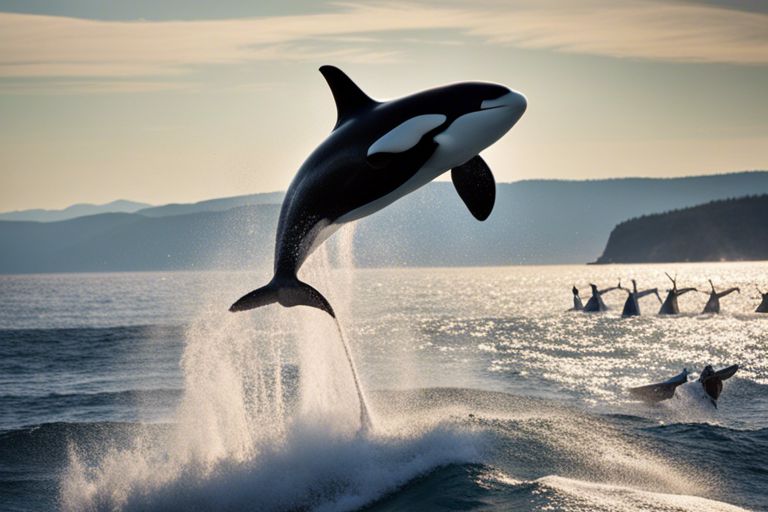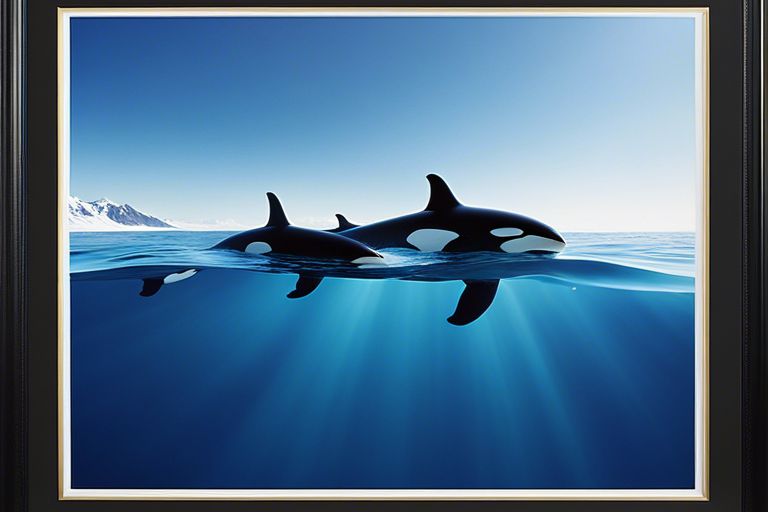Origins of the name “killer whale” can be traced back to ancient sailors who observed these majestic creatures hunting and killing other marine animals. The term “killer whale” actually comes from the Spanish word “asesina ballenas,” which means “whale killer.” Despite their intimidating name, orcas, or “killer whales,” are actually the largest species of the dolphin family. The name “killer whale” is a misnomer, as these remarkable creatures are not whales at all, but are in fact highly intelligent and social predators that hunt in pods and have a diverse diet. Join me as I delve into the interesting history and origins of this extraordinary creature’s name.
Key Takeaways:
- Historical Misunderstanding: The name “killer whale” is a misinterpretation of the original name “whale killer,” given by sailors who witnessed orcas hunting and preying on whales.
- Cultural Influence: The misinterpretation of the name “whale killer” over time led to the common use of “killer whale” in English and other languages, shaping our perception of these majestic marine animals.
- Scientific Classification: Despite its misleading name, the orca is not a whale, but rather the largest species of the dolphin family, known for their complex social structures and highly intelligent behaviors.
- Ambiguous Reputation: The name “killer whale” can give a negative impression of orcas as ruthless predators, but they are actually quite selective in their hunting habits and play a vital role in marine ecosystems.
- Conservation Importance: Understanding the true nature of orcas and their ecological significance can help in promoting their conservation and protecting their natural habitats for future generations.

The Origins of the Name “Killer Whale”
As I delved into the history of the name “Killer Whale,” I discovered that it is a bit of a misnomer. The term “killer” in the name does not refer to the orca’s behavior towards humans or as a bloodthirsty predator. In fact, the name “Killer Whale” is derived from the original name given to these creatures by ancient sailors: “whale killer.” These large marine mammals were given this name because of their hunting prowess and their tendency to prey on other whales, including baleen and sperm whales. If you would like to read more about this fascinating topic, you can visit Why Are They Called Killer Whales? – Wonderopolis.
Historical References to Orca Predatory Behavior
Throughout history, there have been numerous references to the predatory behavior of orcas. In ancient times, sightings of orcas attacking large whales were documented by sailors, giving rise to the name “whale killer.” This behavior was also observed by indigenous coastal communities, who witnessed the remarkable hunting skills of these powerful creatures. While the name “Killer Whale” may evoke fear, it is important to understand that this behavior is a natural part of the orca’s role in the marine ecosystem.
Misunderstandings and Mistranslations
Despite the true meaning behind the name “Killer Whale,” there have been misunderstandings and mistranslations over the centuries that have perpetuated the perception of orcas as ruthless killers. Early encounters with these majestic creatures led to sensationalized stories and misconceptions about their behavior. Additionally, linguistic differences and misinterpretations of indigenous names for orcas have contributed to the negative connotations associated with the name “Killer Whale.” It is crucial to dispel these myths and misconceptions and recognize the orca for its intelligence, social structure, and important role in the ocean ecosystem.
Linguistic and Cultural Influences on the Name
Assuming that the name “killer whale” originated in English, it’s important to consider the linguistic and cultural influences that contributed to this designation. The name “killer whale” is a translation of the Spanish term “orca asesina,” which in turn may have been derived from the Basque term “urtzi” meaning “quarrel.” This suggests a long history of human observation and interaction with orcas, and the impact of different cultures on the naming process.
Native American and First Nations’ Names for Orca
Various Native American and First Nations communities have their own names for the orca, reflecting their unique cultural perspectives and deep connections with these majestic creatures. For example, among the Coast Salish people of the Pacific Northwest, the orca is known as “qal̓qaləx̌ič,” which translates to “spirit of the ocean.” This name highlights the powerful and spiritual significance of orcas in their cultural traditions, emphasizing their positive qualities as revered beings in the natural world.
European Explorers’ Perceptions and Naming
When European explorers first encountered orcas, they were struck by their formidable hunting abilities and presence in the ocean. This led to the designation of “killer whale,” underscoring the dangerous and predatory nature of these creatures as seen through the eyes of early European observers. The name reflected a perception of orcas as formidable apex predators, capable of taking down large marine mammals with awe-inspiring skill and power.
The Evolution of the Name “Killer Whale” in Popular Culture
Now, let’s explore how the name “Killer Whale” has evolved in popular culture over the years. According to CBC News, the term “killer whale” may have been a mistranslation of the Spanish name for orcas, “asesina de ballenas,” which means “whale killer.” This mistranslation led to the animal being called a “killer whale” in English, and the name has stuck ever since.
Impact of Early Naturalists and Scientific Classification
Early naturalists and scientists played a significant role in the classification and naming of the orca. In the 18th and 19th centuries, naturalists began to study and classify various species of marine mammals, including orcas. The early classifications and descriptions of orcas as “killer whales” contributed to the perpetuation of this name in scientific and popular literature. The portrayal of orcas as fierce predators in early scientific works cemented their reputation as top predators in the marine environment and led to the widespread use of the name “killer whale.”
Use of the Name in Film, Literature, and Media
The name “killer whale” has been widely used in popular media, including film, literature, and documentaries. With their striking black and white coloring and impressive hunting abilities, orcas have captured the imagination of filmmakers, authors, and the public. Their portrayal as powerful and intelligent creatures in popular culture has solidified the use of the name “killer whale” in the public consciousness. From classic literature to modern blockbusters, the name “killer whale” has become synonymous with the awe-inspiring nature of these magnificent animals.
Conclusion
From above, it is clear that the name “killer whale” is a misnomer that originated from a misinterpretation of the animal’s behavior. The term “killer whale” does not accurately reflect the orca’s true nature as a highly intelligent and social marine mammal. While they are apex predators, their name should not define them as aggressive killers, but rather as important members of the ocean ecosystem. As we continue to learn more about these magnificent creatures, it is important to shift our perspective and recognize them for the incredible animals that they are. By respecting their true nature and behavior, we can work towards better understanding and conserving their populations for generations to come.
FAQ
Q: What is the origin of the name “killer whale” for orcas?
A: The name “killer whale” is thought to have originated from the term “whale killer,” used by ancient sailors to describe the orca’s predatory behavior towards other whales. Over time, the term evolved into “killer whale.”
Q: Are orcas actually whales or dolphins?
A: Despite the name “killer whale,” orcas are actually the largest members of the dolphin family. They are known for their distinctive black and white coloration, large dorsal fin, and powerful hunting abilities.
Q: How do orcas hunt for their prey?
A: Orcas are highly intelligent and social predators, using sophisticated hunting techniques to catch a variety of prey including fish, seals, and even other whales. They work together in coordinated groups to surround and herd their prey, demonstrating remarkable teamwork and communication skills.
Q: Where are orcas typically found in the wild?
A: Orcas are found in oceans and seas around the world, from the Arctic and Antarctic regions to tropical waters. They are known to inhabit both coastal and open ocean environments, with different populations specializing in particular types of prey and exhibiting distinct behaviors.
Q: Are orcas considered a threat to humans?
A: While wild orcas are apex predators and should be respected, there are very few documented cases of orcas attacking humans in the wild. In fact, orcas are known for their inquisitive and playful behavior towards humans and have been observed interacting with humans in a peaceful manner in the wild.









Leave a comment